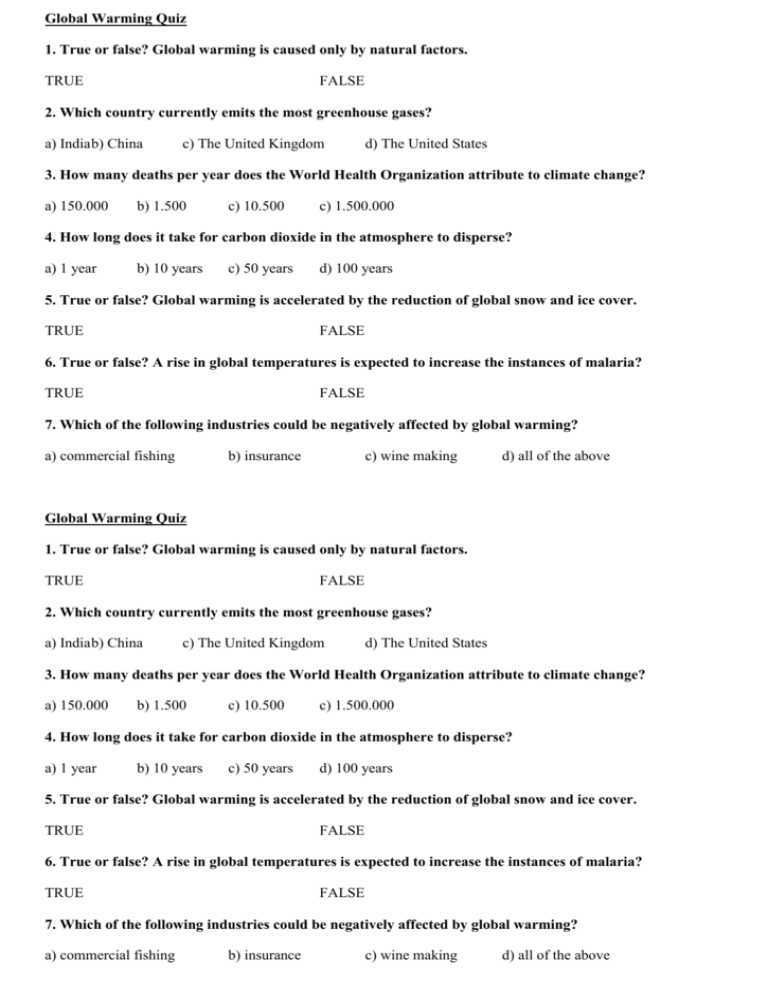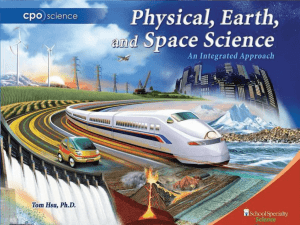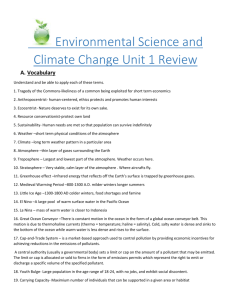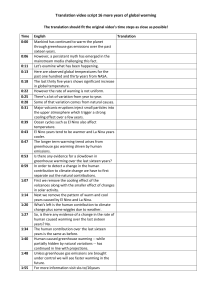Global Warming Quiz
advertisement

Global Warming Quiz 1. True or false? Global warming is caused only by natural factors. TRUE FALSE 2. Which country currently emits the most greenhouse gases? a) India b) China c) The United Kingdom d) The United States 3. How many deaths per year does the World Health Organization attribute to climate change? a) 150.000 b) 1.500 c) 10.500 c) 1.500.000 4. How long does it take for carbon dioxide in the atmosphere to disperse? a) 1 year b) 10 years c) 50 years d) 100 years 5. True or false? Global warming is accelerated by the reduction of global snow and ice cover. TRUE FALSE 6. True or false? A rise in global temperatures is expected to increase the instances of malaria? TRUE FALSE 7. Which of the following industries could be negatively affected by global warming? a) commercial fishing b) insurance c) wine making d) all of the above Global Warming Quiz 1. True or false? Global warming is caused only by natural factors. TRUE FALSE 2. Which country currently emits the most greenhouse gases? a) India b) China c) The United Kingdom d) The United States 3. How many deaths per year does the World Health Organization attribute to climate change? a) 150.000 b) 1.500 c) 10.500 c) 1.500.000 4. How long does it take for carbon dioxide in the atmosphere to disperse? a) 1 year b) 10 years c) 50 years d) 100 years 5. True or false? Global warming is accelerated by the reduction of global snow and ice cover. TRUE FALSE 6. True or false? A rise in global temperatures is expected to increase the instances of malaria? TRUE FALSE 7. Which of the following industries could be negatively affected by global warming? a) commercial fishing b) insurance c) wine making d) all of the above 1. Changes in the climate are partially due natural forces and partially due to human activities. Scientists now believe that most of the planet’s warming in the last few decades has been due to our emissions of greenhouse gases. 2. Perenially atop the list of global greenhouse gases emitters, the United States was surpassed in 2006-07 by China, whose roaring industrial sector has pushed the country’s carbon emissions to double-digit annual increases. 3. The World Health Organization blames 150.000 deaths per year on the effects of global warming, including extreme weather, drought, heat waves, decreased food production and the increased spread of vector-born diseases like malaria. 4. Which means even if carbon dioxide emissions ceased immediately, past actions would still affect the planets for decades to come. 5. Ice-covered surfaces reflect more solar-energy than ice-free surfaces and therefore have a global cooling effect. As ice-covered surfaces are reduced, global warming will accelerate because more heat will be absorbed. 6. Rising temperatures allow mosquitoes to survive at higher altitudes, potentially bringing them to regions that lack population immunity. In addition, the transmission period for vector-borne diseases is increased with expanded warm seasons (source: World Health Organization) 7. Insurance companies can expect to pay out more in disaster claims. The fishing industry will suffer from depleted fish stocks. Some wine regions will no longer be able to sustain wine crops. 1. Changes in the climate are partially due natural forces and partially due to human activities. Scientists now believe that most of the planet’s warming in the last few decades has been due to our emissions of greenhouse gases. 2. Perenially atop the list of global greenhouse gases emitters, the United States was surpassed in 2006-07 by China, whose roaring industrial sector has pushed the country’s carbon emissions to double-digit annual increases. 3. The World Health Organization blames 150.000 deaths per year on the effects of global warming, including extreme weather, drought, heat waves, decreased food production and the increased spread of vector-born diseases like malaria. 4. Which means even if carbon dioxide emissions ceased immediately, past actions would still affect the planets for decades to come. 5. Ice-covered surfaces reflect more solar-energy than ice-free surfaces and therefore have a global cooling effect. As ice-covered surfaces are reduced, global warming will accelerate because more heat will be absorbed. 6. Rising temperatures allow mosquitoes to survive at higher altitudes, potentially bringing them to regions that lack population immunity. In addition, the transmission period for vector-borne diseases is increased with expanded warm seasons (source: World Health Organization) 7. Insurance companies can expect to pay out more in disaster claims. The fishing industry will suffer from depleted fish stocks. Some wine regions will no longer be able to sustain wine crops.







